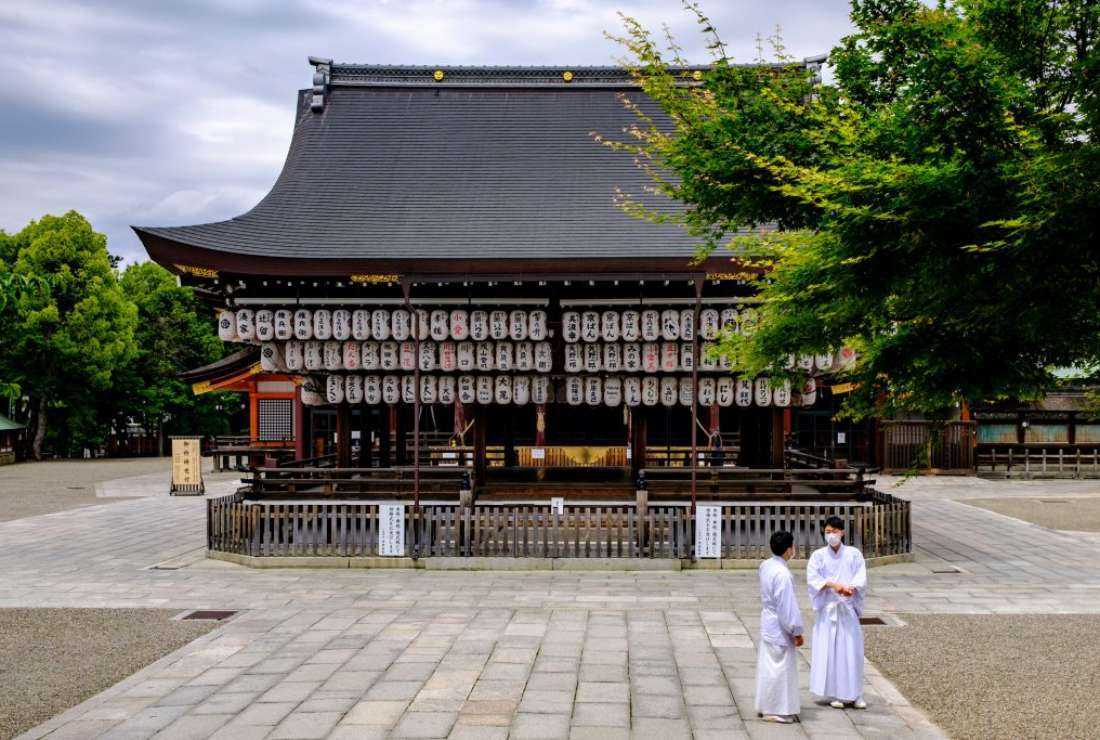
The trend stems from a decline in population in cities and increased scrutiny of religious groups since PM Abe's assassination

Yasaka Shrine in Kyoto, western Japan, is seen in this file image. Various religious corporations are accused of 'extra-legal' online sales for tax breaks. (Photo: AFP)
Religious corporations in Japan have engaged in illegal online ownership sales through brokers allegedly for tax exemption and preferential tax rates, says a report.
The main reason for such extralegal trading is the tax exemption on fixed assets on the premises of worship places, corporate tax exemption, and preferential tax rates for various activities conducted by the organization, the Mainichi reported on May 21.
According to Japanese law, religious organizations enjoy preferential tax rates for 34 types of businesses that would otherwise have higher tax rates. The income from monetary offerings to shrines is also exempted.
Hidenori Ukai, a Buddhist monk and journalist, pointed out that the increased sale of religious corporations in recent years is due to a decline in population in regional cities.
"Religious corporations are sold here and there. I guess it is not easy for officials of administrative agencies overseeing them to uncover the trading," Ukai said.
He pointed out that some religious corporations were on sale due to the aging of their leaders thus affecting their activities, loss of their leaders due to death or sickness, or becoming paper companies.
Japanese law requires religious corporations that are inactive to report to the authorities concerned for dissolution procedures.
But the profits that can be gained from extralegal sales and tax manipulation often put such organizations in high demand for trading.
An unnamed official from the Religious Affairs Division under the Agency for Cultural Affairs said that the sale and purchase of religious organizations are forbidden.
"Trading religious corporations for profits is not permitted. It is extralegal,” the official said.
The Mainichi reported religious corporations posted ads on scrap sale websites saying: "Historic temples (religious corporation) on offer," referring to two temples in central Japan and the Kansai region priced at 120 million yen (US$881,000).
The ads further highlight the benefits of purchasing the religious corporation such as “splendid main halls” and “large plots of land.”
The seller who claimed to be a "consultant for improving temple management, etc." refused to comment when approached.
An unnamed broker in his 60s from Osaka pointed out that many not-for-profit religious corporations often engage in business activities that are solely profit-oriented.
"Some religious corporations are even running a large number of love hotels (hotels for couples). It is definitely more profitable to run a business as a religious corporation than creating a regular company," the broker said.
One of the other factors that drive the sale of religious corporations is the lucrative brokerage commission that the buyer and seller give the brokers, the report said.
The lack of monitoring from the government results in corporations manipulating their documents to conduct their businesses undetected.
According to an unnamed broker, the name of the ex-head of the religious corporations is kept along with the other corporate executives for a while to avoid suspicion and scrutiny.
"I'm doing my business covertly,” said the unnamed broker.
Another broker revealed that the increasing trend in inquiries about purchasing religious institutions has been on the rise since last year when the Family Federation for World Peace and Unification, commonly known as the Unification Church, and its "spiritual sales" tactics had come under renewed scrutiny.
Unification Church came under the spotlight after a gunman shot dead former Japanese Prime Minister Shinzo Abe on July 8, 2022, for his alleged ties with the controversial church.
"There will be more buyers moving forward, as it has been reported that religious corporations are making money thanks to tax breaks and donations," the broker said.
Help us keep UCA News independent
The Church in Asia needs objective and independent journalism to speak the truth about the Church and the state.
With a network of professionally qualified journalists and editors across Asia, UCA News is just about meeting that need. But professionalism does not come cheap. We depend on you, our readers, to help maintain our independence and seek that truth.
A small donation of US$2 a month would make a big difference in our quest to achieve our goal.

Share your comments